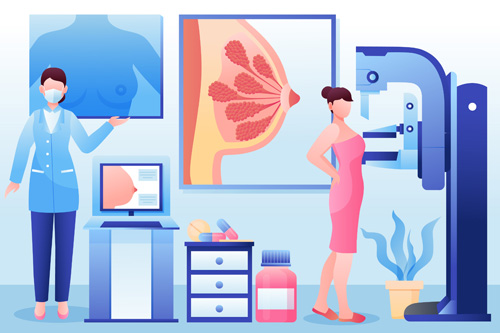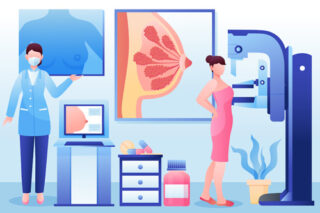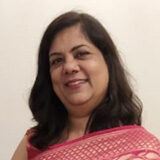Mammography: When Do You Need It Sooner?

Mammography: When Do You Need It Sooner?
Dr. Smriti Hari
India’s Leading Breast Imaging Expert
 As women, we often put our health on the back burner while juggling the demands of work, family, and everything in between.
As women, we often put our health on the back burner while juggling the demands of work, family, and everything in between.
An essential aspect of maintaining good health is keeping a close watch on our breasts.
You might be wondering, “When should I start thinking about mammograms?”
The answer might surprise you: sooner rather than later.
Although the standard recommended age by medical authorities for normal-risk women to begin routine mammography is 40 years,[1] it’s equally important for younger women with high-risk profiles to be screened earlier.
Mammography remains the recommended modality for routine breast screening.[2] Do not depend on breast self-exams for early detection[3] irrespective of your age. By the time you can feel a tumor, it’s likely larger and potentially dangerous.
Knowing your risk profile for your career and family’s sake:
Our bodies are unique, and so are the health risks we face. While it’s true that breast cancer risk is often associated with women over 40, younger women are not immune. That’s why it’s crucial to understand your risk factors and make informed decisions about your health.
If you have a family history of breast cancer, a personal history of previous breast lumps (including non-cancerous), early menstruation before the age of 12,[1] certain genetic mutations, etc., waiting until you’re 40 to begin routine annual mammograms might not be safe for you.
While the above risk factors are not in your control, you can avoid certain controllable factors that raise the risk of breast cancer, such as inactive lifestyle, smoking, alcohol consumption, having a first pregnancy after age 30, and certain hormone replacement therapies.4
Breast density, a hidden risk factor:
A crucial factor that often goes overlooked is breast density.
While many women have heard of breast density, few understand its implications. Breast density refers to the amount of fatty tissue versus glandular tissue in your breasts. Women with dense breasts have more glandular and connective tissue.
Your breasts may not feel different if they are dense. Also, breast density is not related to firmness or size. You can only tell if someone has dense breast tissue on a mammogram.[2]
High breast density is a well-established risk factor for breast cancer. Women with dense breasts are at a higher risk of developing the disease.[3]
Dense breasts used to pose another risk previously with older technology mammograms. It was hard for doctors to detect cancer hiding underneath dense tissue in some cases. But now the latest 3D mammography machines are designed to provide higher quality images with more comfort and improve breast cancer detection in dense breast tissue from multiple angles.[4]
The younger you are, the denser your breasts are:
Breast density tends to be higher in younger women, making it all the more important for those younger than 40 to be proactive about their breast health. Know your density today irrespective of your age, and consult your doctor to check if you need any extra protection.
Breast cancer in women with dense breasts was about 22% more than in women with non-dense breasts as measured by a Norwegian study that examined 3,07,015 digital screening records of over 1,00,000 women.[5]
Starting an annual mammography screening routine earlier than age 40 may benefit the women with dense breasts as found by another large US study of more than 5 million mammograms.[6]
High-risk, high-priority:
Younger women with high-risk profiles should not delay taking proactive steps to monitor their breast health. This doesn’t mean you need to start panicking; it simply means you’re taking charge of your well-being and ensuring that you catch any potential issues at an earlier, more manageable stage.
The next steps:
- If you’re a woman younger than 40 with a high-risk profile, it’s time to talk with your doctor about starting routine mammograms sooner rather than later. Don’t let misconceptions about age or the notion that breast cancer only affects older women hold you back from ensuring your well-being.
- If you are above 30 years of age with no high-risk profile, remember, breast density is a crucial breast cancer risk factor. Since it tends to be higher in younger women. please find your breast density today with a routine mammogram. If you have dense breasts, it may be safer for you to subscribe to an annual screening plan now in consultation with your doctor.
- If you are 40 or above with neither dense breasts nor other high risks such as personal or family history, begin your annual screening mammography routine now because the vast majority of breast cancers occur due to unknown causes and factors in women above 40 years who are healthy otherwise. Remember, you can’t prevent breast cancer. Early detection is the best protection.
Hence, it’s never too early to start prioritizing your health for the sake of your career and family. By arming yourself with knowledge and making informed choices about mammography, you’re empowering yourself to navigate your well-being with confidence and resilience.
Don’t wait. Take charge of your breast health today for a brighter and healthier tomorrow!

Dr. Smriti Hari
Professor, Dept of Radiodiagnosis & Interventional Radiology
AIIMS, Delhi
- https://www.acraccreditation.org/Mammography-Saves-Lives/Guidelines accessed on 25 Aug 2023
- https://www.webmd.com/breast-cancer/features/mammography-still-gold-standard-for-breast-cancer accessed on 25 Aug 2023
- https://www.mayoclinic.org/tests-procedures/breast-exam/about/pac-20393237 accessed on 25 Aug 2023
- https://www.cdc.gov/cancer/breast/basic_info/risk_factors.htm accessed on 26 Aug 2023
- https://www.cdc.gov/cancer/breast/basic_info/dense-breasts.htm#:~:text=Women%20with%20dense%20breasts%20have%20a%20higher%20chance%20of%20getting,%2Ddense%20(fatty)%20breasts. accessed on 26 Aug 2023.
- Boyd NF, Guo H, Martin LJ, et al. Mammographic Density and the Risk and Detection of Breast Cancer. New England Journal of Medicine. 2007;356(3):227-236. doi:10.1056/nejmoa062790
- https://www.mayoclinic.org/tests-procedures/3d-mammogram/about/pac-20438708 accessed on 26 Aug 2023
- Moshina N, Sebuødegård S, Lee CI, et al. Automated Volumetric Analysis of Mammographic Density in a Screening Setting: Worse Outcomes for Women with Dense Breasts. Radiology. 2018;288(2):343-352. doi:10.1148/radiol.2018172972
- Lee CS, Ashih H, Sengupta D, Sickles EA, Zuley M, Pisano E. Risk-Based Screening Mammography for Women Aged. Journal of the American College of Radiology. 2020;17(3):368-376. doi:10.1016/j.jacr.2019.08.033
